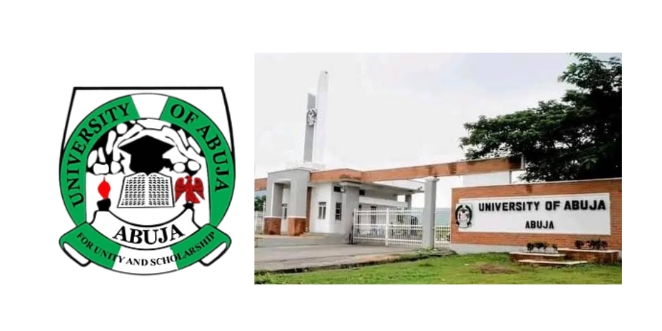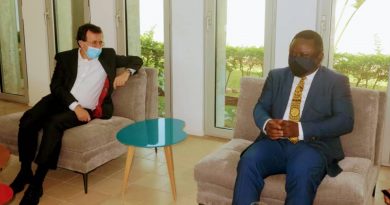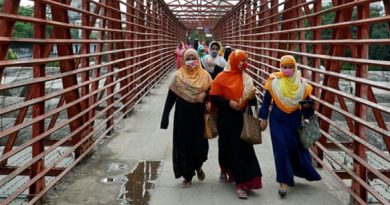WHITHER UNIABUJA?
By Nick Dazang
It may look outlandish, if not preposterous, to suggest that this writer was present at the creation of the University of Abuja in 1988, my apologies to Dean Acheson who wrote the Pulitzer Prize book of the same title(PRESENT AT THE CREATION) in 1969. But with due respect, I can claim to be a witness.
We were, the pioneer Vice Chancellor of the said university, Professor Isa Mohammed, and my humble self, kindred spirits of sorts. Both of us were summoned to pioneer separate projects, and with differing magnitudes, in a Capital City that was hitherto pristine and infra structurally deprived. We were neighbors at Wuse Zone Six, Abuja, where our projects began. We took joy in mutually exchanging experiences, insights and lessons learned.
Following the establishment of the University of Abuja in January 1988 by military fiat, Professor Mohammed was mandated to commence a dual-mode institution, namely, a conventional university and a distance learning program. In 1990, the University moved from Wuse to a mini-campus at Gwagwalada.
Professor Mohammed was well credentialed and experienced. He had excelled at the University of Calabar. It is a measure of his success and administrative prowess that some of his former staff at Calabar eagerly accompanied him to Abuja to support his efforts in founding the new university.
Professor Mohammed was obsessed with founding a world-class university. In this pre-occupation he was following in the tradition of Nigeria’s first and second generation universities. To accomplish this vision, he sought after academics who had excelled by way of erudition and who possessed integrity.
Drawing from his membership, and later Chairmanship of the Joint Admissions and Matriculation Board (JAMB), Professor Mohammed paid more than a casual attention to the caliber of students that were admitted. He was reported to have meticulously identified and recommended scholars to be admitted to the university. This ensured that the university started on a solid and sure academic footing.
But before his ten-year helmsman ship of the nascent university lapsed, allegations of high-handedness were rife against Professor Mohammed. Worse, these allegations were bandied by some of the stellar professors he had procured and whose seminal efforts put the university in excellent academic stead.
There is no gain saying it that clashes of ideas, and sometimes those of ego, are common place and go with the academic territory. They are a sign that a citadel of learning is in intellectual ferment and that it brooks dissent. But when it is clarion and clangorous, it undermines the university as a healthy market of contending ideas.
Consequent upon these dysfunctions and the departure of some of its respected academics, the university’s fortunes and high standard took a nose dive. Its fortunes waned until the advent of Professor Nuhu Omeiza Yaqub of blessed memory. Professor Yaqub brought academic verve and respectability to the university. It was on his watch that the university transitioned from the mini-campus at Gwagwalada to its permanent site at Giri.
In spite of Professor Yaqub’s yeoman’s job, his successors did not seem to be at par with him. Neither did they set great store by the academic excellence and stability which he did. The university’s own staff, which it recruited to run its school, were treated shabbily. Not even their several sorties and cogent complaints at the Human Rights Radio were hearkened to by obdurate and pharaoh-like administrations. Even after a Court of competent jurisdiction had ruled that they be paid their entitlements, the university is dithering and is reluctant to do so.
Not long ago, the university staff were reported to have exulted at the exit of one of its haughty Vice-Chancellors. Thus, rather than proceed on a steady and sustained trajectory of excellence and stability and to lay premium on good governance, the university appears to have a storied pedigree. It boasts of a history that is marked and defined by an unfortunate oscillation between excellence and capriciousness.
This proclivity to oscillate between tranquility and tempest is exemplified by the recent appointment of Professor Aisha Sani Maikudi which is mired in controversy. The University’s Governing Council, chaired by Air Vice Marshal Saddiq Ismailia Kaita(Rtd), in a statement on 30th December 2024, said it had approved the appointment of Professor Maikudi as the seventh substantive Vice Chancellor of the University.
According to a statement by the Acting Director, Information and University Relations, Dr. Habib Yakoob, Professor Maikudi emerged as the best among ten shortlisted candidates interviewed by the Joint Council and Senate Selection Board of the University.
Shortly after this announcement, however, forty three academics of the university differed. They alleged, among others, that the appointment did not follow due process; that Professor Maikudi was favored by the Governing Council; and that whereas the guidelines and regulations of the university stipulate that a prospective candidate for the position of Vice Chancellor must have served as a professor for at least ten years, Professor Maikudi did so for a mere two years.
Coming hot on the heels of the petition by the aforementioned, another set of 109 academics and members of the university senate have written President Bola Ahmed Tinubu defending the process that led to the appointment of Professor Maikudi.
These developments are troubling. The allegations, too, are certainly weighty. They should be thoroughly investigated by the supervising Ministry. If they are valid, the Visitor of the University, President Bola Ahmed Tinubu, should direct her to step down. The same fate should be visited on the Council if these accusations are true. However, if the allegations are unfounded, the government should say so in clear and unmistakable terms.
If corners were cut for Professor Maikudi, and if her appointment is allowed to stand, as a consequence, it will offend merit and excellence. It will visit violence to the hallowed principles of excellence and integrity on which universities are premised. It will also set a bad precedent and embolden other Governing Councils to cut corners and to foist candidates that may be undeserving.
More importantly, if these allegations are correct, they go against the grain of the university’s high minded motto, namely:”For Unity and Scholarship”. Amity, learning and thoroughness can not thrive where corners are cut.




